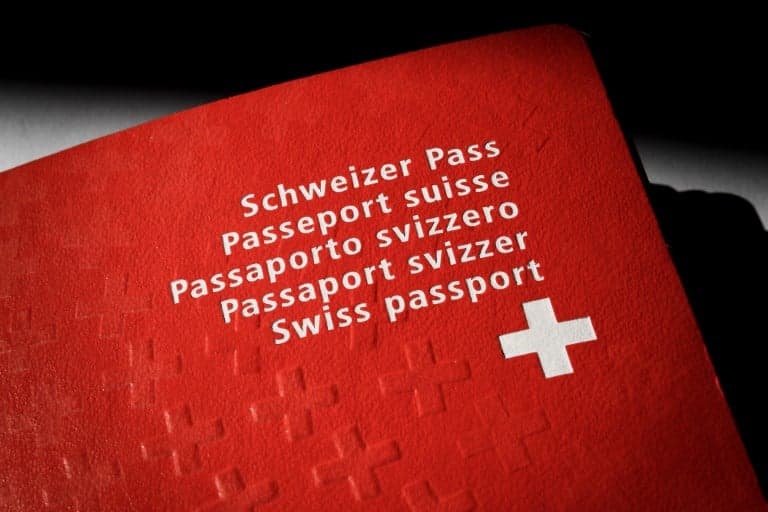'Broken system': The fight to make it easier for foreigners to get Swiss citizenship

The rules on gaining Swiss citizenship are notoriously strict and dissuade many foreign residents from applying. But a new campaign launched in Zurich aims to make it easier. The Local interviewed a campaigner to find out about it.
In 2023 around a quarter of people living and working in Switzerland are foreigners without a Swiss citizenship.
Foreign residents in Switzerland pay taxes and contribute to the country - but are not allowed to participate in elections.
For Andrin Eichin, board member of the Aktion Vierviertel organisation, urgent action is required to reform Switzerland’s naturalisation law, which is among the strictest in Europe. In Switzerland, foreigners must have lived in the country for an average of ten years to be able to apply for citizenship – and a cantonal move can mean that number further increases.
Now Aktion Vierviertel’s initiative is hitting the ground running. The organisation is gearing up for the collection of some 100,000 signatures from late spring. It has 18 months to accomplish this in order to initiate a popular vote on the proposal.
But what was the motivation behind the launch of said initiative?
READ MORE: IN NUMBERS: How many people become Swiss each year – and where do they come from?
'Wake up call'
Aktion Vierviertel’s founding parties were inspired to launch the initiative following the implementation of Switzerland’s amended Civil Rights Act, which came into force on January 1st 2018. The law sees that only well-integrated foreigners receive the Swiss passport, with the amendment further specifying the decisive integration criteria for naturalisation.
But according to Eichin, what was meant to make becoming Swiss more attainable for foreigners, instead made matters worse.
“I think for a lot of us, this was kind of a wakeup call that something needs to be done,” he says, emphasising the growing percentage of foreigners living in Switzerland and the importance of them being actively represented in Swiss society.
"We are now living in a democracy where a continuously smaller number decides for everybody - and we're now at 25 percent foreigners.
"This means that one quarter of people that live in Switzerland do not have a right to vote and have in some instances less rights when it comes to where they settle, how they can behave and how they live. And that's something that we think for a modern society and for a modern democracy is not right."

The criteria for Swiss citizenship are very strict. Photo: Fabrice Coffini / AFP
Eichin also highlights the many recent attempts in Swiss parliament to change this - two motions of which were only just rejected in the last year alone - as another reason he believes "pressure must be applied from outside, or nothing will change".
The initiative now seeks a reduction in the residency period required to apply for naturalisation – from ten down to five years. This would bring Switzerland’s average closer to the three to six-year residency requirement for naturalisation in its surrounding European countries. Aktion Vierviertel’s motivation, Eichin says, is twofold.
"Concretely, we want to make it easier for foreigners to become Swiss, and that means they have to wait less to apply. The second crucial element is that we want to stop the arbitrariness that is sometimes part of the immigration process in Switzerland."
Different rules in communes
At present, Switzerland has over 2,100 different immigration procedures, one for every commune. To name an example: an individual living in Basel-City, who has a two-year residency requirement, may find themselves struggling with the rising cost of living in the bustling city - but a move to the more affordable Basel-Country, which has a minimum residency requirement of five years, may mean an even longer waiting time before said individual qualifies for naturalisation.
This, Eichin believes, should not be the case. “We think it's not right that whether you have a chance or not to get a Swiss passport depends on where you live.”
READ ALSO: Zurich, Basel, Geneva or Vaud: Where is it easier to get Swiss citizenship?
In addition to the initiative’s two key elements, it also seeks to start a dialogue about what kind of society people living in Switzerland – foreigners and Swiss – would like to be a part of in the future and who they would like to belong to that society.
“And I think this debate - at the moment – is not happening at all,” Eichen says.
The 10-year residency requirement coupled with a lack of flexibility in terms of moving as well as the at times debatable interview process for naturalisation have also left a mark on applicants. Some have been left feeling defeated, while others refuse to attempt a renewed try at obtaining the red passport altogether.
"We only have anecdotal evidence on this, but a lot of people say they actually don't want to naturalise anymore because they feel they are discouraged by the process, or they are afraid of the fact that they have to go through this procedure. For some people, it's anxiety inducing. They think they will fail. They think they don't get a chance to prove that they can be part of this society."
In the long run, Eichin reckons this could have fatal consequences for integration and that enabling foreigners to feel that they are wanted and can play an active part of Swiss society is crucial for Switzerland’s future.
"I personally think something is fundamentally broken in the system. If we are at that point where people are afraid to even try to become Swiss."

A man carries a Swiss flag. Photo by Fabrice COFFRINI / AFP
'Diverse country'
But what does it mean to become Swiss? In the end, Eichin says, there is not one answer and therein lies the very issue. But Aktion Vierviertel proposes a solution: when it comes to naturalisation, there should be only objective criteria.
"Switzerland is a diverse country. We have a lot of different languages. We have a lot of different communities. Different cultures, many local traditions.
"The reality of the 'Swiss way of life' is so very different for everybody. And I think that's why we have an issue with this notion of integration. In the end, the notion of integration that's currently in the law is highly subjective and leaves room for arbitrariness. That's why we think there should be no such integration criteria at all.”
Instead, all criteria should be entirely objective. Those wishing to become Swiss should have lived in Switzerland for five years, not been served with a long-term prison sentence, not endanger the internal and external security of the country, and have basic knowledge of a national language.
And as to how Eichin feels about the outcome?
"Very positive. We have a really big alliance of progressive organisations in Switzerland. The supporters range from political parties, civil society organisations to trade unions - and let's not forget, 25 percent of the people in Switzerland are concerned. They have friends, co-workers, people they play football and spend their time with."
Lastly, he banks on precisely those without a political voice in Switzerland to see this as an opportunity to speak up, encourage others to sign the initiative and become part of a political movement.
For more information on the initiative, head over to www.aktionvierviertel.ch.
Comments
See Also
In 2023 around a quarter of people living and working in Switzerland are foreigners without a Swiss citizenship.
Foreign residents in Switzerland pay taxes and contribute to the country - but are not allowed to participate in elections.
For Andrin Eichin, board member of the Aktion Vierviertel organisation, urgent action is required to reform Switzerland’s naturalisation law, which is among the strictest in Europe. In Switzerland, foreigners must have lived in the country for an average of ten years to be able to apply for citizenship – and a cantonal move can mean that number further increases.
Now Aktion Vierviertel’s initiative is hitting the ground running. The organisation is gearing up for the collection of some 100,000 signatures from late spring. It has 18 months to accomplish this in order to initiate a popular vote on the proposal.
But what was the motivation behind the launch of said initiative?
READ MORE: IN NUMBERS: How many people become Swiss each year – and where do they come from?
'Wake up call'
Aktion Vierviertel’s founding parties were inspired to launch the initiative following the implementation of Switzerland’s amended Civil Rights Act, which came into force on January 1st 2018. The law sees that only well-integrated foreigners receive the Swiss passport, with the amendment further specifying the decisive integration criteria for naturalisation.
But according to Eichin, what was meant to make becoming Swiss more attainable for foreigners, instead made matters worse.
“I think for a lot of us, this was kind of a wakeup call that something needs to be done,” he says, emphasising the growing percentage of foreigners living in Switzerland and the importance of them being actively represented in Swiss society.
"We are now living in a democracy where a continuously smaller number decides for everybody - and we're now at 25 percent foreigners.
"This means that one quarter of people that live in Switzerland do not have a right to vote and have in some instances less rights when it comes to where they settle, how they can behave and how they live. And that's something that we think for a modern society and for a modern democracy is not right."

Eichin also highlights the many recent attempts in Swiss parliament to change this - two motions of which were only just rejected in the last year alone - as another reason he believes "pressure must be applied from outside, or nothing will change".
The initiative now seeks a reduction in the residency period required to apply for naturalisation – from ten down to five years. This would bring Switzerland’s average closer to the three to six-year residency requirement for naturalisation in its surrounding European countries. Aktion Vierviertel’s motivation, Eichin says, is twofold.
"Concretely, we want to make it easier for foreigners to become Swiss, and that means they have to wait less to apply. The second crucial element is that we want to stop the arbitrariness that is sometimes part of the immigration process in Switzerland."
Different rules in communes
At present, Switzerland has over 2,100 different immigration procedures, one for every commune. To name an example: an individual living in Basel-City, who has a two-year residency requirement, may find themselves struggling with the rising cost of living in the bustling city - but a move to the more affordable Basel-Country, which has a minimum residency requirement of five years, may mean an even longer waiting time before said individual qualifies for naturalisation.
This, Eichin believes, should not be the case. “We think it's not right that whether you have a chance or not to get a Swiss passport depends on where you live.”
READ ALSO: Zurich, Basel, Geneva or Vaud: Where is it easier to get Swiss citizenship?
In addition to the initiative’s two key elements, it also seeks to start a dialogue about what kind of society people living in Switzerland – foreigners and Swiss – would like to be a part of in the future and who they would like to belong to that society.
“And I think this debate - at the moment – is not happening at all,” Eichen says.
The 10-year residency requirement coupled with a lack of flexibility in terms of moving as well as the at times debatable interview process for naturalisation have also left a mark on applicants. Some have been left feeling defeated, while others refuse to attempt a renewed try at obtaining the red passport altogether.
"We only have anecdotal evidence on this, but a lot of people say they actually don't want to naturalise anymore because they feel they are discouraged by the process, or they are afraid of the fact that they have to go through this procedure. For some people, it's anxiety inducing. They think they will fail. They think they don't get a chance to prove that they can be part of this society."
In the long run, Eichin reckons this could have fatal consequences for integration and that enabling foreigners to feel that they are wanted and can play an active part of Swiss society is crucial for Switzerland’s future.
"I personally think something is fundamentally broken in the system. If we are at that point where people are afraid to even try to become Swiss."

'Diverse country'
But what does it mean to become Swiss? In the end, Eichin says, there is not one answer and therein lies the very issue. But Aktion Vierviertel proposes a solution: when it comes to naturalisation, there should be only objective criteria.
"Switzerland is a diverse country. We have a lot of different languages. We have a lot of different communities. Different cultures, many local traditions.
"The reality of the 'Swiss way of life' is so very different for everybody. And I think that's why we have an issue with this notion of integration. In the end, the notion of integration that's currently in the law is highly subjective and leaves room for arbitrariness. That's why we think there should be no such integration criteria at all.”
Instead, all criteria should be entirely objective. Those wishing to become Swiss should have lived in Switzerland for five years, not been served with a long-term prison sentence, not endanger the internal and external security of the country, and have basic knowledge of a national language.
And as to how Eichin feels about the outcome?
"Very positive. We have a really big alliance of progressive organisations in Switzerland. The supporters range from political parties, civil society organisations to trade unions - and let's not forget, 25 percent of the people in Switzerland are concerned. They have friends, co-workers, people they play football and spend their time with."
Lastly, he banks on precisely those without a political voice in Switzerland to see this as an opportunity to speak up, encourage others to sign the initiative and become part of a political movement.
For more information on the initiative, head over to www.aktionvierviertel.ch.
Join the conversation in our comments section below. Share your own views and experience and if you have a question or suggestion for our journalists then email us at [email protected].
Please keep comments civil, constructive and on topic – and make sure to read our terms of use before getting involved.
Please log in here to leave a comment.